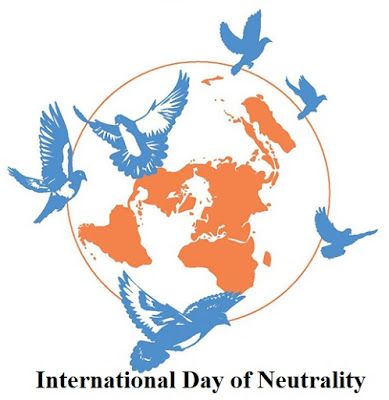“5 Powerful Reasons Why International Day of Neutrality Matters for Global Peace”
What is the International Day of Neutrality?
The International Day of Neutrality, observed on December 12, is dedicated to promoting the principles of neutrality in international relations and emphasizing the importance of peace and conflict resolution. The day was established by the United Nations General Assembly to raise awareness about the significant role of neutrality in international diplomacy and global peacekeeping efforts.
Neutrality refers to a state of non-participation in conflicts between other states, ensuring that a country does not take sides in any military or political disputes. Neutral countries typically focus on diplomacy and humanitarian work rather than engaging in military alliances or conflict.
On this day, countries and organizations worldwide come together to highlight the importance of neutrality in maintaining peace and stability. It provides an opportunity for reflection on how neutrality can contribute to reducing global tensions and fostering cooperation between nations.
History of International Day of Neutrality
The idea of neutral countries has existed for centuries, but the formal recognition of neutrality in the modern context was laid out during the Geneva Conventions in the 19th century. Switzerland, the most well-known neutral country, has played a central role in promoting neutrality and peace throughout history. The country’s tradition of neutrality dates back to the 1815 Congress of Vienna, where it was recognized as a neutral state.
The International Day of Neutrality was first recognized by the United Nations General Assembly in 2017. It was created in response to growing global tensions and conflicts, encouraging countries to adopt neutral stances in disputes to prevent escalation and avoid unnecessary wars.
The day also serves as a reminder of the contributions made by neutral states to humanitarian efforts, peacekeeping operations, and international diplomacy. Neutral countries often host peace talks and provide mediation between conflicting parties.
Daily Life Impacts of International Day of Neutrality
Though neutrality may seem like a distant political concept, its impact can be felt in daily life. Here’s how:
- Diplomatic Solutions: Neutral countries often facilitate peace talks and diplomatic negotiations between warring nations. The peaceful resolution of conflicts can reduce global tensions and promote a safer world.
- Humanitarian Aid: Neutral states often focus on providing humanitarian aid to those affected by wars and conflicts, including refugees, displaced individuals, and communities in crisis.
- Global Stability: By promoting neutrality, the world can avoid the devastating consequences of global warfare, ensuring that daily life for millions remains stable and secure.
- Encouraging Cooperation: Neutrality promotes dialogue, mutual understanding, and cooperation. By abstaining from partisan conflicts, neutral nations can help foster a more inclusive global community.
Key Facts About International Day of Neutrality
Here are some key facts about International Day of Neutrality:
- Neutrality in International Law: According to international law, neutral countries are expected not to engage in conflicts or provide military support to any party involved in a war. These countries maintain their independence and sovereignty while focusing on peaceful coexistence.
- Switzerland’s Role: Switzerland is one of the most prominent examples of a neutral country. The Swiss government has a long-standing tradition of neutrality, having not participated in any military conflicts since 1815. Switzerland hosts various international organizations, such as the Red Cross, that focus on humanitarian aid.
- Neutral Countries in History: Throughout history, several nations have chosen neutrality as a means of ensuring their security and contributing to global peace. Countries such as Sweden, Ireland, and Finland are examples of neutral nations with active roles in diplomacy and conflict mediation.
- International Impact: Neutral countries often provide a platform for international diplomacy, serving as intermediaries for nations seeking peaceful resolutions to conflicts. These countries frequently host peace negotiations and help facilitate discussions between conflicting parties.
Significance of International Day of Neutrality
The International Day of Neutrality holds significant importance in the current global landscape for several reasons:
- Promotion of Peace: Neutrality can be a powerful tool in promoting global peace. By abstaining from conflicts and fostering dialogue, neutral nations can create opportunities for diplomatic solutions and avoid the escalation of violence.
- Conflict Prevention: Neutral countries help prevent conflicts from spreading by acting as mediators and providing diplomatic channels for dialogue. They ensure that disputes do not escalate into full-scale wars.
- Humanitarian Contributions: Neutral countries often prioritize humanitarian aid and relief efforts. They provide critical support to refugees, displaced persons, and those affected by war, which can save lives and rebuild communities.
- Global Cooperation: Neutrality encourages nations to work together toward shared goals, such as climate change mitigation, sustainable development, and economic cooperation. By avoiding military alliances, neutral countries can serve as examples of peaceful cooperation.
- A Global Call for Tolerance: The day encourages countries to embrace tolerance and non-violence. Neutrality offers a blueprint for how states can coexist without resorting to war or violent conflict, promoting a safer and more just world for future generations.
How is International Day of Neutrality Observed?
International Day of Neutrality is observed in various ways by countries, organizations, and individuals:
- Conferences and Seminars: Many international organizations and diplomatic institutions hold conferences and seminars to discuss the role of neutrality in conflict resolution and peacebuilding efforts.
- Educational Programs: Schools and universities around the world use the day to teach students about neutrality, its historical importance, and its relevance in today’s world. This includes lectures, discussions, and debates on global peace and diplomacy.
- Social Media Campaigns: Organizations and governments use social media platforms to raise awareness about the significance of neutrality in international relations. They share facts, stories, and historical examples of how neutrality has helped maintain peace.
- Diplomatic Engagements: Neutral countries may organize diplomatic events and meetings to promote international cooperation and peaceful resolution of conflicts. These events often serve as a platform for peaceful dialogue and negotiations.
- Humanitarian Initiatives: Many neutral countries focus on promoting humanitarian initiatives on this day, from providing aid to conflict zones to supporting global efforts for refugee protection.
Frequently Asked Questions (FAQs)
1. What is the main purpose of the International Day of Neutrality?
The main purpose is to raise awareness about the importance of neutrality in international relations and its role in maintaining peace, preventing conflicts, and fostering global cooperation.
2. Why is neutrality important in today’s world?
Neutrality helps prevent the escalation of conflicts, promotes dialogue between nations, and allows neutral countries to provide humanitarian aid to those affected by wars and disputes.
3. Which countries practice neutrality?
Countries like Switzerland, Sweden, Finland, and Ireland are known for their neutrality, often serving as mediators in international conflicts and promoting peace.
Wishing on International Day of Neutrality
Here are some messages you can share on International Day of Neutrality:
- “Today, let’s reflect on the power of neutrality in bringing nations together and fostering global peace. Happy International Day of Neutrality!”
- “On this International Day of Neutrality, let’s commit to peaceful resolutions and mutual respect. Together, we can build a more peaceful world.”
- “Wishing everyone a world where diplomacy and dialogue triumph over conflict. Happy International Day of Neutrality!”
Conclusion
The International Day of Neutrality serves as a powerful reminder of the importance of non-violence, diplomacy, and peaceful cooperation in today’s increasingly polarized world. By embracing neutrality, countries can help prevent conflicts, promote global peace, and contribute to the protection of human rights. As the world faces numerous challenges, neutrality provides a blueprint for ensuring that diplomacy and dialogue always come first. This day encourages us to reflect on the role each of us can play in promoting a more peaceful, tolerant, and cooperative world.











This online service provides a wide range of medications for ordering online.
You can easily buy treatments with just a few clicks.
Our product list includes popular solutions and targeted therapies.
All products is provided by trusted pharmacies.
https://community.alteryx.com/t5/user/viewprofilepage/user-id/577248
We ensure user protection, with encrypted transactions and timely service.
Whether you’re managing a chronic condition, you’ll find safe products here.
Explore our selection today and get trusted online pharmacy service.
This website makes available many types of pharmaceuticals for easy access.
You can conveniently access health products with just a few clicks.
Our catalog includes standard medications and custom orders.
The full range is acquired via reliable suppliers.
https://www.provenexpert.com/en-us/priligy-online3/
We ensure customer safety, with data protection and fast shipping.
Whether you’re managing a chronic condition, you’ll find trusted options here.
Visit the store today and experience stress-free access to medicine.